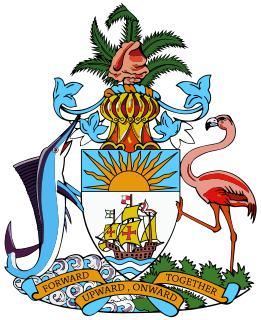
The politics of Dominica takes place in a framework of a parliamentary representative democratic republic, whereby the Prime Minister of Dominica is the head of government, and of a multi-party system. Executive power is exercised by the government. Legislative power is vested in both the government and the House of Assembly. The Judiciary is independent of the executive and the legislature.

The politics of Saint Kitts and Nevis takes place in the framework of a federal parliamentary democracy. Saint Kitts and Nevis is an independent Commonwealth realm with Elizabeth II as its head of state, represented by a governor-general. He acts on the advice of the prime minister, who is the majority party leader in the National Assembly, and who, with a cabinet, conducts affairs of state.

Politics of Saint Lucia takes place in the framework of an independent parliamentary democratic constitutional monarchy, with Queen Elizabeth II as its head of state, represented by a Governor General, who acts on the advice of the prime minister and the cabinet. The prime minister is the leader of the majority party of the house, and the cabinet conducts affairs of state. The Governor General exercises basically ceremonial functions, but residual powers, under the constitution, can be used at the governor general's discretion. The actual power in St. Lucia lies with the prime minister and the cabinet, usually representing the majority party in parliament.
Politics of Saint Vincent and the Grenadines takes place in the framework of a parliamentary democracy. Saint Vincent and the Grenadines is an independent Commonwealth realm, with Queen Elizabeth II as its head of state, represented by a Governor General, who acts on the advice of the prime minister and the cabinet. The prime minister is the leader of the majority party of the House of Assembly, and the cabinet conducts affairs of state. The Governor-General exercises ceremonial functions, but reserve powers, under the Saint Vincent and the Grenadines constitution, can be used at the Governor General's discretion.

The politics of Barbados function within a framework of constitutional monarchy and a parliamentary government with strong democratic traditions; constitutional safeguards for nationals of Barbados include: freedom of speech, press, worship, movement, and association.

Sir Anerood Jugnauth GCSK, KCMG, QC, MP, PC is a Mauritian politician who has served as both President and Prime Minister of Mauritius. He is Member of Parliament for Piton & Riviere Du Rempart.

Elections in Antigua and Barbuda take place in the framework of a parliamentary democracy.

The Mouvement Militant Mauricien (MMM) is a left-wing socialist political party in Mauritius. The party was formed by a group of students in the late 1960s. The MMM advocates what it sees as a "fairer" society, without discrimination on the basis of social class, race, community, caste, religion, gender or sexual orientation.

Elections in the Bahamas take place in the framework of a parliamentary democracy. Since independence voter turnout has been generally high in national elections, with a low of 87.9% in 1987 and a high of 98.5% in 1997. The current Prime Minister is the Hon Hubert Minnis.

Elections in Dominica have been taking place since 1832. Dominica elects on national level a legislature. The House of Assembly has 32 members, 21 members elected for a five-year term in single-seat constituencies, 9 appointed senators, the Speaker and 1 ex officio member. a head of state - the president - is elected by the House of Assembly.

The House of Representatives is the lower house of the National Assembly of Thailand, the legislative branch of the Thai government. The system of government of Thailand is that of a constitutional monarchy and a parliamentary democracy. The system of the Thai legislative branch is modelled after the Westminster system. The House of Representatives has 500 members, all of which are democratically elected: 375 members were directly elected through single constituency elections, while the other 125 are elected through party-list proportional representation. The roles and powers of the House of Representatives were enshrined in the Constitution of 2017.

The National Assembly is Mauritius's unicameral legislature, which was called the Legislative Assembly until 1992, when the country became a republic. The Constitution of Mauritius provides for the parliament of Mauritius to consist of the President and the National Assembly. The parliament of Mauritius is modelled after the Westminster system of parliamentary democracy, where members of parliament are voted in at regular general elections, on the basis of a first past the post system.

General elections were held in Dominica on 5 May 2005. The result was a victory for the ruling Dominica Labour Party, which won 12 of the 21 seats in the House of Assembly. The opposition United Workers' Party unsuccessfully made legal challenges to several of the constituency results.
Ronald Milner Green is a Dominican politician who has served as the head of the United Workers' Party (UWP). In that capacity, Green was also the Leader of the Opposition of Dominica from 2005 until 2009, when he lost his seat in the House of Assembly in the general election. Green is now serving in the Assembly as an appointed senator.
Hector John is a Dominican politician in the United Workers' Party. He is the current Leader of the Opposition, the youngest ever to hold that position. He was first elected as a Representative to the House of Assembly in 2009.
Dayton Baptiste is a Dominican politician in the Dominica Labour Party, and a former police officer in Antigua. He served briefly as an appointed senator in the Dominica House of Assembly in 2010, and has twice been an unsuccessful candidate for an elected seat.
A by-election was held on 9 July 2010 in Dominica, to fill two seats in the House of Assembly that were declared vacant. The contested seats were both won by significant margins by the incumbent candidates, who were members of the opposition United Workers' Party.
Norris Prevost is a Dominican politician in the United Workers' Party. He has served in the House of Assembly of Dominica since 1990.

















